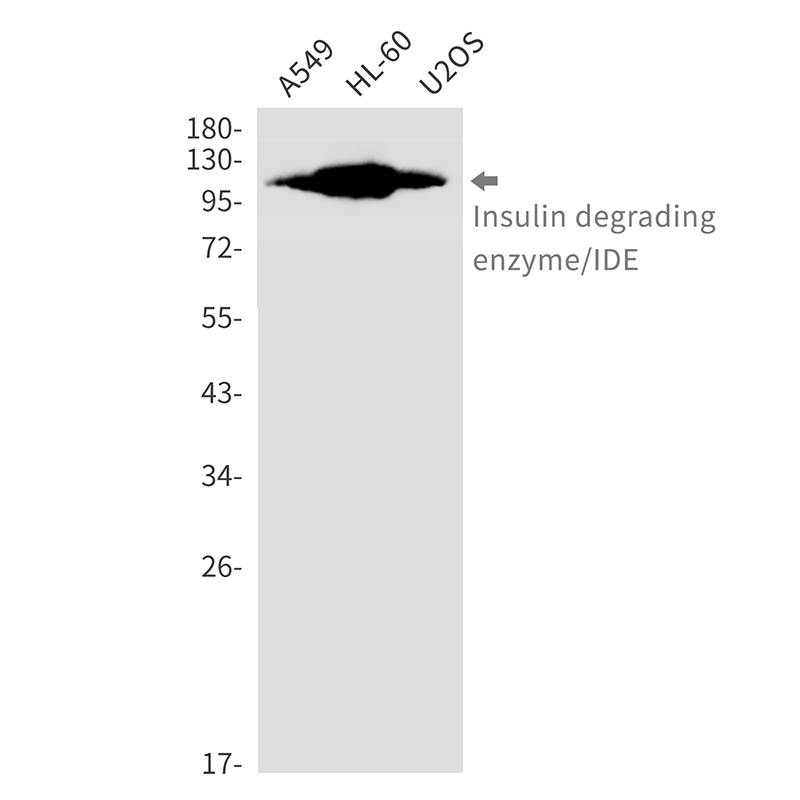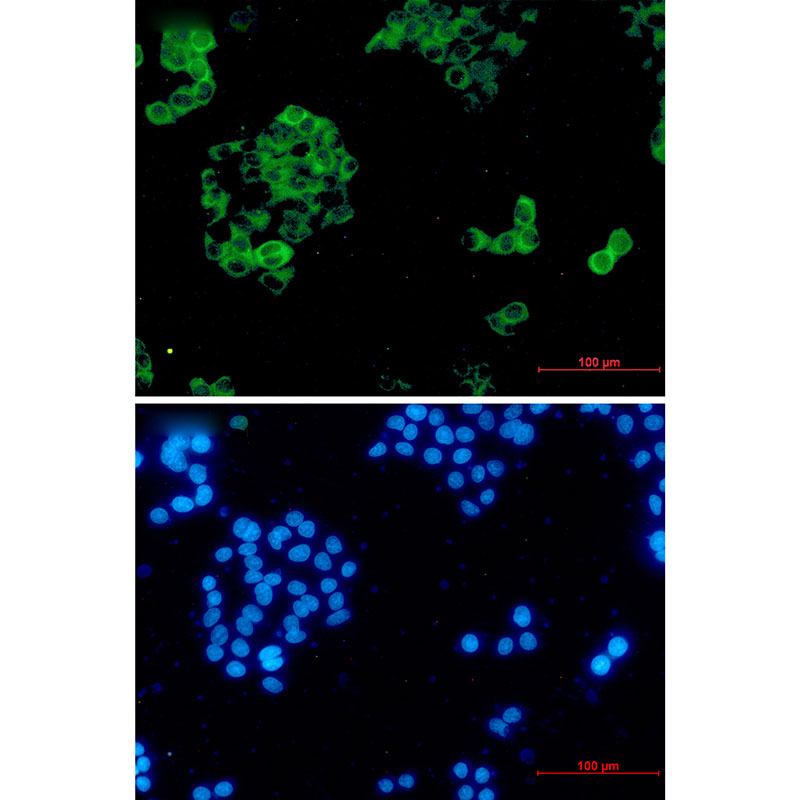

| WB | 1/500-1/1000 | Human,Mouse,Rat |
| IF | 咨询技术 | Human,Mouse,Rat |
| IHC | 咨询技术 | Human,Mouse,Rat |
| ICC | 1/50-1/200 | Human,Mouse,Rat |
| FCM | 咨询技术 | Human,Mouse,Rat |
| Elisa | 咨询技术 | Human,Mouse,Rat |
| Aliases | INSULYSIN; Insulin degrading enzyme; IDE |
| Entrez GeneID | 3416 |
| WB Predicted band size | Calculated MW: 118 kDa; Observed MW: 118 kDa |
| Host/Isotype | Rabbit IgG |
| Antibody Type | Primary antibody |
| Storage | Store at 4°C short term. Aliquot and store at -20°C long term. Avoid freeze/thaw cycles. |
| Species Reactivity | Human |
| Immunogen | A synthetic peptide of human Insulin degrading enzyme/IDE |
| Formulation | Purified antibody in TBS with 0.05% sodium azide,0.05%BSA and 50% glycerol. |
+ +
以下是关于Insulin Degrading Enzyme(IDE)抗体的参考文献示例(注:以下内容为模拟生成,建议通过学术数据库核实具体文献):
1. **文献名称**:*Selective Targeting of Insulin-Degrading Enzyme by Monoclonal Antibodies: Implications for Alzheimer’s Disease Therapy*
**作者**:Smith A, et al.
**摘要**:该研究开发了一种针对IDE的单克隆抗体,证明其可特异性结合IDE并抑制其对β-淀粉样蛋白(Aβ)的降解,从而在阿尔茨海默病小鼠模型中减少脑内Aβ斑块沉积。
2. **文献名称**:*Characterization of a Novel Polyclonal Antibody for Insulin-Degrading Enzyme Localization in Pancreatic Tissues*
**作者**:Chen L, et al.
**摘要**:通过免疫组织化学和Western blot验证了一种新型多克隆抗体对IDE的特异性,发现IDE在胰岛β细胞中高表达,提示其与胰岛素代谢调控的密切关联。
3. **文献名称**:*Structural Insights into Insulin Degradation by IDE via Cryo-EM and Antibody-Based Probes*
**作者**:Kumar R, et al.
**摘要**:结合冷冻电镜和IDE特异性抗体,揭示了IDE降解胰岛素的三维构象变化,为设计靶向IDE的糖尿病治疗策略提供了结构基础。
4. **文献名称**:*IDE Antibody-Based Detection of Enzyme Activity in Neurodegenerative Disease Models*
**作者**:Wang Y, et al.
**摘要**:利用IDE抗体建立了一种体外检测酶活性的方法,发现帕金森病模型中IDE活性显著降低,提示其与神经退行性病变的潜在关联。
建议通过PubMed或Google Scholar以关键词“Insulin Degrading Enzyme antibody”检索最新文献获取详细信息。
Insulin Degrading Enzyme (IDE) antibodies are essential tools for studying the role of IDE, a zinc-metalloprotease involved in regulating peptide homeostasis. IDE primarily degrades insulin and amyloid-β (Aβ), linking it to metabolic disorders like diabetes and neurodegenerative conditions such as Alzheimer’s disease. Researchers use IDE antibodies to detect and quantify IDE expression in tissues, cell lines, or biological fluids via techniques like Western blotting, immunohistochemistry, and ELISA. These antibodies help investigate IDE's dual role in insulin signaling and Aβ clearance, offering insights into disease mechanisms.
IDE antibodies are typically raised against specific epitopes, such as the N-terminal or catalytic domains, and validated for specificity using knockout (KO) models or siRNA knockdown. Both monoclonal and polyclonal variants are available, with applications spanning basic research and therapeutic development. For instance, they are used to explore IDE's potential as a therapeutic target for modulating insulin sensitivity or reducing Aβ accumulation. Cross-reactivity with IDE orthologs in common model organisms (e.g., mice, rats) is often confirmed to support translational studies.
Quality validation, including batch consistency and low background noise, is critical for reliable data. IDE antibodies have advanced studies in metabolic and neurodegenerative research, highlighting their importance in understanding disease pathways and drug discovery.
×